Contemporary Project Management: Project Failure, Impacts, & Methods
VerifiedAdded on 2023/01/11
|14
|3248
|64
Report
AI Summary
This report delves into the critical aspects of project failure, exploring the major reasons behind project setbacks across various fields. It identifies unplanned project initiation and ineffective project team management as primary contributors to failure, utilizing secondary research methods to analyze causes, impacts, and preventive measures. The report highlights key factors such as poorly defined scope, inadequate risk management, poor project management, inexperienced project managers, inaccurate estimations, lack of communication, lack of detailed planning, and issues in resource allocation as significant causes. It further examines the negative impacts of project failure, including financial losses, reputational damage, failure to meet business requirements, and lack of innovation. The report then proposes preventive measures, such as effective project planning, accurate scope identification, robust risk management, and improved communication, to mitigate these risks and enhance the likelihood of project success. The analysis underscores the importance of proactive strategies in project management to avoid failures and achieve desired outcomes.
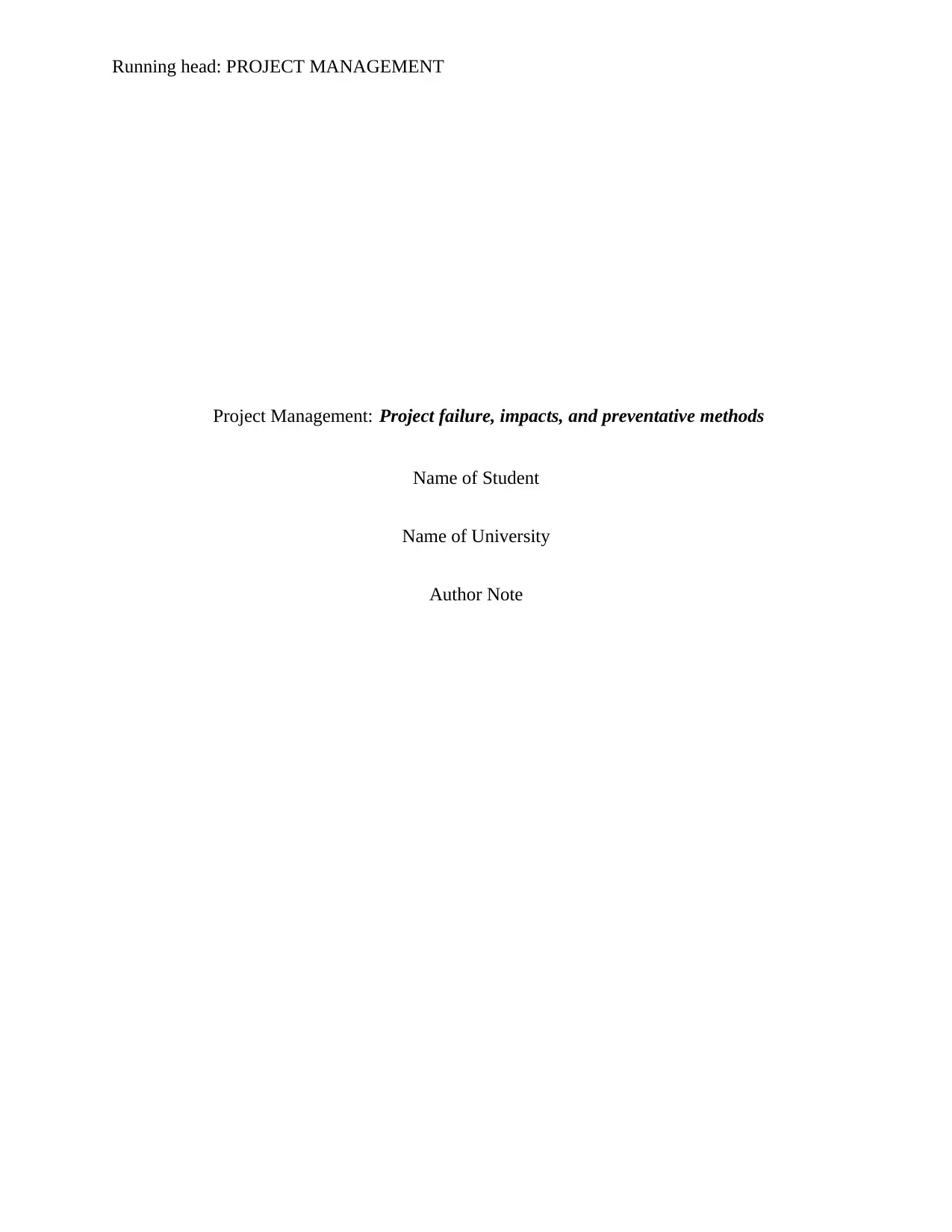
Running head: PROJECT MANAGEMENT
Project Management: Project failure, impacts, and preventative methods
Name of Student
Name of University
Author Note
Project Management: Project failure, impacts, and preventative methods
Name of Student
Name of University
Author Note
Paraphrase This Document
Need a fresh take? Get an instant paraphrase of this document with our AI Paraphraser
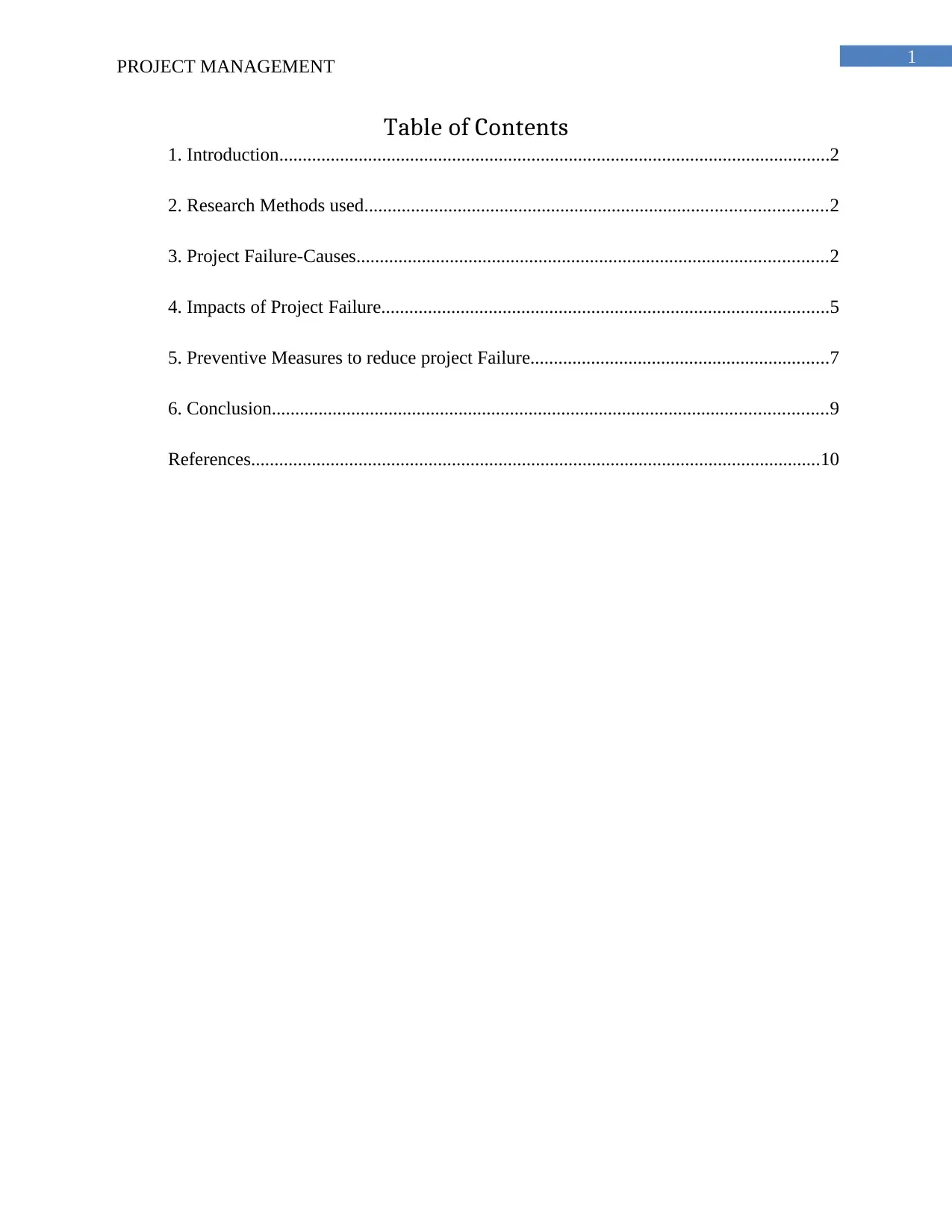
1
PROJECT MANAGEMENT
Table of Contents
1. Introduction......................................................................................................................2
2. Research Methods used...................................................................................................2
3. Project Failure-Causes.....................................................................................................2
4. Impacts of Project Failure................................................................................................5
5. Preventive Measures to reduce project Failure................................................................7
6. Conclusion.......................................................................................................................9
References..........................................................................................................................10
PROJECT MANAGEMENT
Table of Contents
1. Introduction......................................................................................................................2
2. Research Methods used...................................................................................................2
3. Project Failure-Causes.....................................................................................................2
4. Impacts of Project Failure................................................................................................5
5. Preventive Measures to reduce project Failure................................................................7
6. Conclusion.......................................................................................................................9
References..........................................................................................................................10
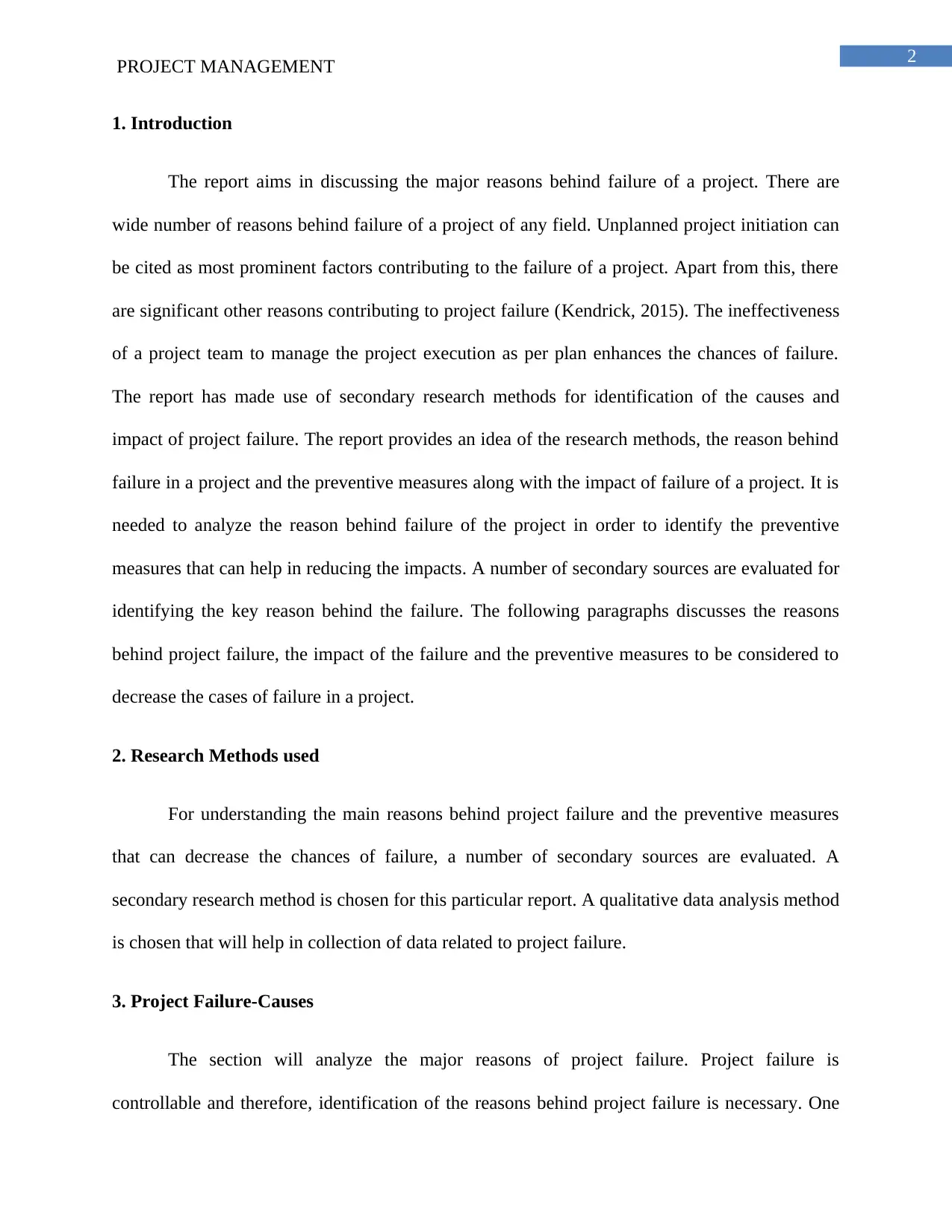
2
PROJECT MANAGEMENT
1. Introduction
The report aims in discussing the major reasons behind failure of a project. There are
wide number of reasons behind failure of a project of any field. Unplanned project initiation can
be cited as most prominent factors contributing to the failure of a project. Apart from this, there
are significant other reasons contributing to project failure (Kendrick, 2015). The ineffectiveness
of a project team to manage the project execution as per plan enhances the chances of failure.
The report has made use of secondary research methods for identification of the causes and
impact of project failure. The report provides an idea of the research methods, the reason behind
failure in a project and the preventive measures along with the impact of failure of a project. It is
needed to analyze the reason behind failure of the project in order to identify the preventive
measures that can help in reducing the impacts. A number of secondary sources are evaluated for
identifying the key reason behind the failure. The following paragraphs discusses the reasons
behind project failure, the impact of the failure and the preventive measures to be considered to
decrease the cases of failure in a project.
2. Research Methods used
For understanding the main reasons behind project failure and the preventive measures
that can decrease the chances of failure, a number of secondary sources are evaluated. A
secondary research method is chosen for this particular report. A qualitative data analysis method
is chosen that will help in collection of data related to project failure.
3. Project Failure-Causes
The section will analyze the major reasons of project failure. Project failure is
controllable and therefore, identification of the reasons behind project failure is necessary. One
PROJECT MANAGEMENT
1. Introduction
The report aims in discussing the major reasons behind failure of a project. There are
wide number of reasons behind failure of a project of any field. Unplanned project initiation can
be cited as most prominent factors contributing to the failure of a project. Apart from this, there
are significant other reasons contributing to project failure (Kendrick, 2015). The ineffectiveness
of a project team to manage the project execution as per plan enhances the chances of failure.
The report has made use of secondary research methods for identification of the causes and
impact of project failure. The report provides an idea of the research methods, the reason behind
failure in a project and the preventive measures along with the impact of failure of a project. It is
needed to analyze the reason behind failure of the project in order to identify the preventive
measures that can help in reducing the impacts. A number of secondary sources are evaluated for
identifying the key reason behind the failure. The following paragraphs discusses the reasons
behind project failure, the impact of the failure and the preventive measures to be considered to
decrease the cases of failure in a project.
2. Research Methods used
For understanding the main reasons behind project failure and the preventive measures
that can decrease the chances of failure, a number of secondary sources are evaluated. A
secondary research method is chosen for this particular report. A qualitative data analysis method
is chosen that will help in collection of data related to project failure.
3. Project Failure-Causes
The section will analyze the major reasons of project failure. Project failure is
controllable and therefore, identification of the reasons behind project failure is necessary. One
⊘ This is a preview!⊘
Do you want full access?
Subscribe today to unlock all pages.

Trusted by 1+ million students worldwide
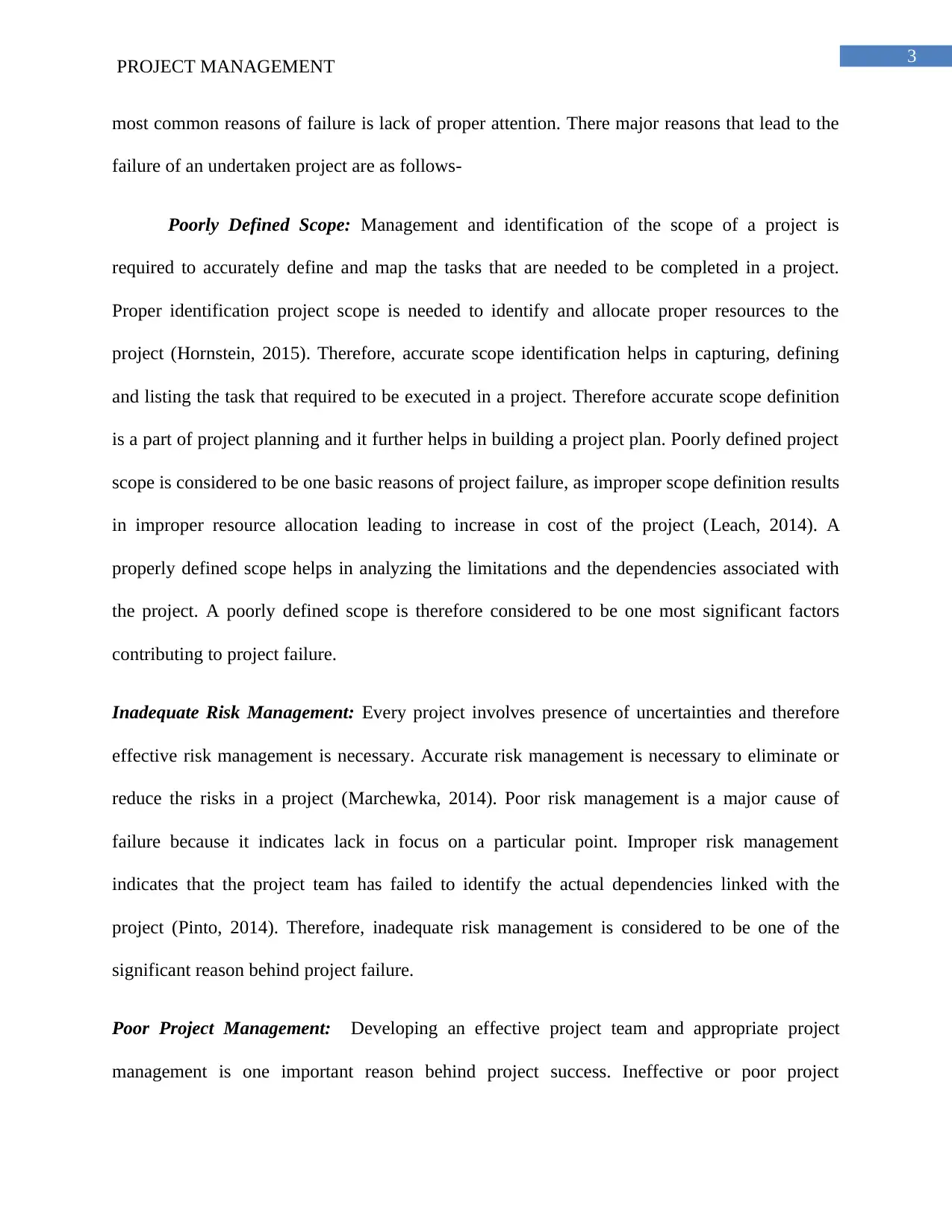
3
PROJECT MANAGEMENT
most common reasons of failure is lack of proper attention. There major reasons that lead to the
failure of an undertaken project are as follows-
Poorly Defined Scope: Management and identification of the scope of a project is
required to accurately define and map the tasks that are needed to be completed in a project.
Proper identification project scope is needed to identify and allocate proper resources to the
project (Hornstein, 2015). Therefore, accurate scope identification helps in capturing, defining
and listing the task that required to be executed in a project. Therefore accurate scope definition
is a part of project planning and it further helps in building a project plan. Poorly defined project
scope is considered to be one basic reasons of project failure, as improper scope definition results
in improper resource allocation leading to increase in cost of the project (Leach, 2014). A
properly defined scope helps in analyzing the limitations and the dependencies associated with
the project. A poorly defined scope is therefore considered to be one most significant factors
contributing to project failure.
Inadequate Risk Management: Every project involves presence of uncertainties and therefore
effective risk management is necessary. Accurate risk management is necessary to eliminate or
reduce the risks in a project (Marchewka, 2014). Poor risk management is a major cause of
failure because it indicates lack in focus on a particular point. Improper risk management
indicates that the project team has failed to identify the actual dependencies linked with the
project (Pinto, 2014). Therefore, inadequate risk management is considered to be one of the
significant reason behind project failure.
Poor Project Management: Developing an effective project team and appropriate project
management is one important reason behind project success. Ineffective or poor project
PROJECT MANAGEMENT
most common reasons of failure is lack of proper attention. There major reasons that lead to the
failure of an undertaken project are as follows-
Poorly Defined Scope: Management and identification of the scope of a project is
required to accurately define and map the tasks that are needed to be completed in a project.
Proper identification project scope is needed to identify and allocate proper resources to the
project (Hornstein, 2015). Therefore, accurate scope identification helps in capturing, defining
and listing the task that required to be executed in a project. Therefore accurate scope definition
is a part of project planning and it further helps in building a project plan. Poorly defined project
scope is considered to be one basic reasons of project failure, as improper scope definition results
in improper resource allocation leading to increase in cost of the project (Leach, 2014). A
properly defined scope helps in analyzing the limitations and the dependencies associated with
the project. A poorly defined scope is therefore considered to be one most significant factors
contributing to project failure.
Inadequate Risk Management: Every project involves presence of uncertainties and therefore
effective risk management is necessary. Accurate risk management is necessary to eliminate or
reduce the risks in a project (Marchewka, 2014). Poor risk management is a major cause of
failure because it indicates lack in focus on a particular point. Improper risk management
indicates that the project team has failed to identify the actual dependencies linked with the
project (Pinto, 2014). Therefore, inadequate risk management is considered to be one of the
significant reason behind project failure.
Poor Project Management: Developing an effective project team and appropriate project
management is one important reason behind project success. Ineffective or poor project
Paraphrase This Document
Need a fresh take? Get an instant paraphrase of this document with our AI Paraphraser
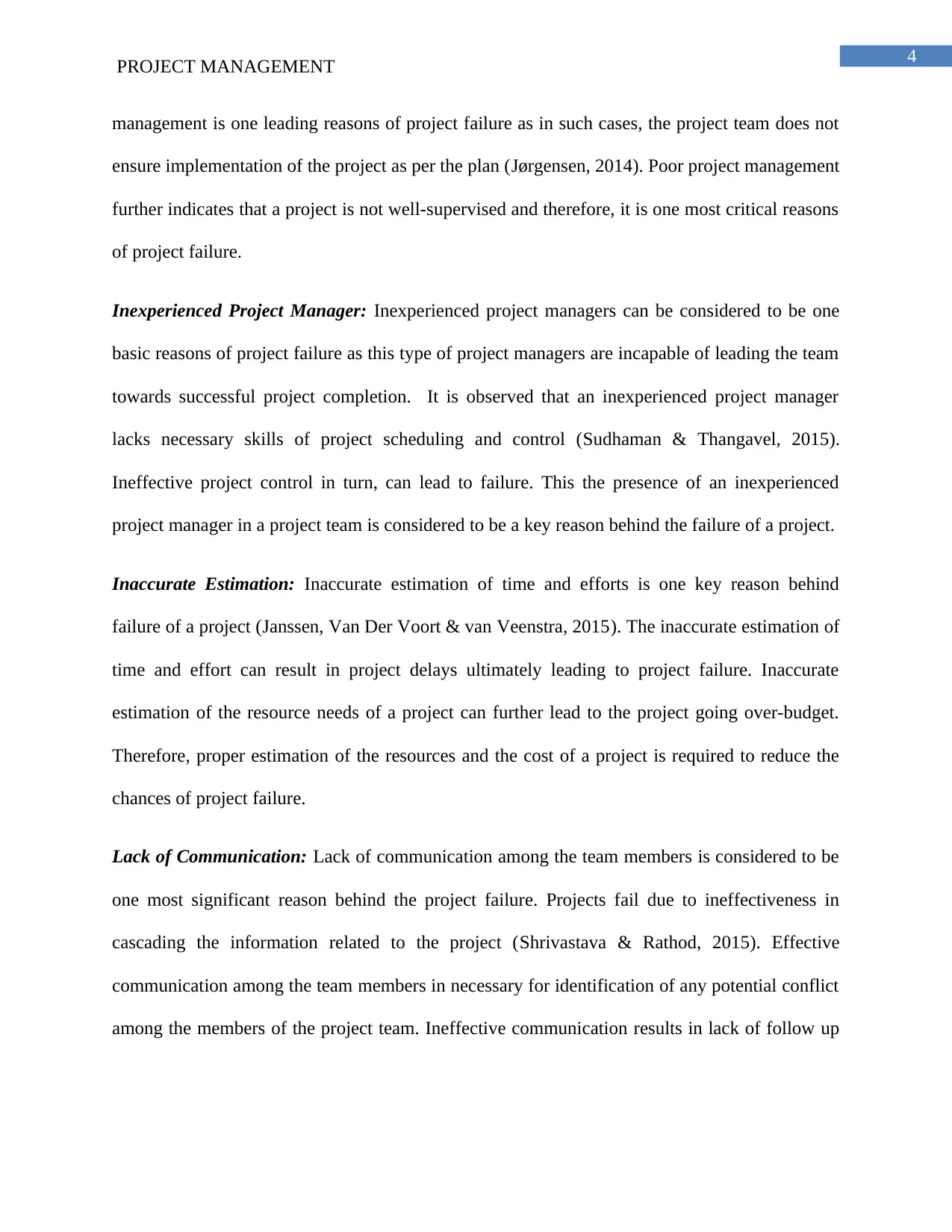
4
PROJECT MANAGEMENT
management is one leading reasons of project failure as in such cases, the project team does not
ensure implementation of the project as per the plan (Jørgensen, 2014). Poor project management
further indicates that a project is not well-supervised and therefore, it is one most critical reasons
of project failure.
Inexperienced Project Manager: Inexperienced project managers can be considered to be one
basic reasons of project failure as this type of project managers are incapable of leading the team
towards successful project completion. It is observed that an inexperienced project manager
lacks necessary skills of project scheduling and control (Sudhaman & Thangavel, 2015).
Ineffective project control in turn, can lead to failure. This the presence of an inexperienced
project manager in a project team is considered to be a key reason behind the failure of a project.
Inaccurate Estimation: Inaccurate estimation of time and efforts is one key reason behind
failure of a project (Janssen, Van Der Voort & van Veenstra, 2015). The inaccurate estimation of
time and effort can result in project delays ultimately leading to project failure. Inaccurate
estimation of the resource needs of a project can further lead to the project going over-budget.
Therefore, proper estimation of the resources and the cost of a project is required to reduce the
chances of project failure.
Lack of Communication: Lack of communication among the team members is considered to be
one most significant reason behind the project failure. Projects fail due to ineffectiveness in
cascading the information related to the project (Shrivastava & Rathod, 2015). Effective
communication among the team members in necessary for identification of any potential conflict
among the members of the project team. Ineffective communication results in lack of follow up
PROJECT MANAGEMENT
management is one leading reasons of project failure as in such cases, the project team does not
ensure implementation of the project as per the plan (Jørgensen, 2014). Poor project management
further indicates that a project is not well-supervised and therefore, it is one most critical reasons
of project failure.
Inexperienced Project Manager: Inexperienced project managers can be considered to be one
basic reasons of project failure as this type of project managers are incapable of leading the team
towards successful project completion. It is observed that an inexperienced project manager
lacks necessary skills of project scheduling and control (Sudhaman & Thangavel, 2015).
Ineffective project control in turn, can lead to failure. This the presence of an inexperienced
project manager in a project team is considered to be a key reason behind the failure of a project.
Inaccurate Estimation: Inaccurate estimation of time and efforts is one key reason behind
failure of a project (Janssen, Van Der Voort & van Veenstra, 2015). The inaccurate estimation of
time and effort can result in project delays ultimately leading to project failure. Inaccurate
estimation of the resource needs of a project can further lead to the project going over-budget.
Therefore, proper estimation of the resources and the cost of a project is required to reduce the
chances of project failure.
Lack of Communication: Lack of communication among the team members is considered to be
one most significant reason behind the project failure. Projects fail due to ineffectiveness in
cascading the information related to the project (Shrivastava & Rathod, 2015). Effective
communication among the team members in necessary for identification of any potential conflict
among the members of the project team. Ineffective communication results in lack of follow up
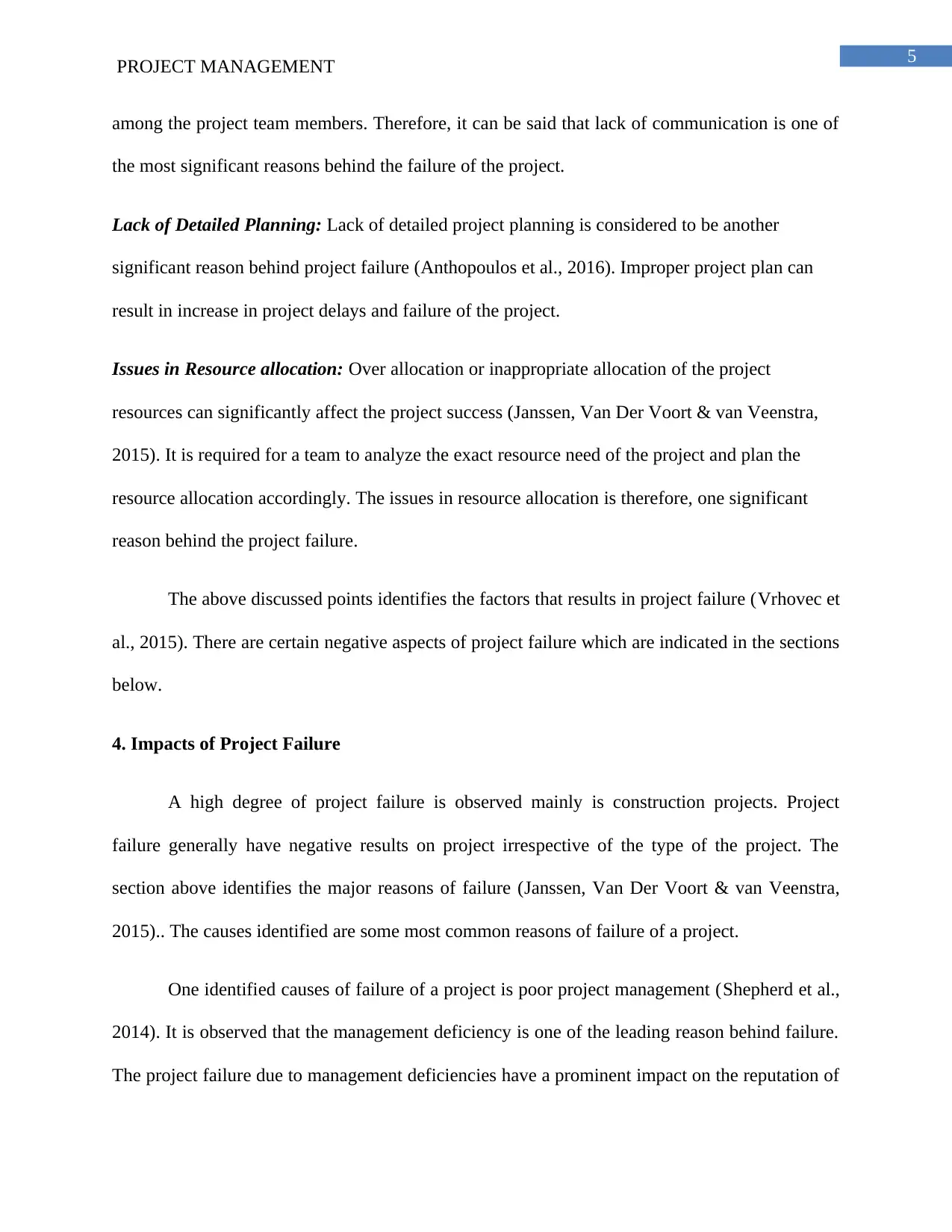
5
PROJECT MANAGEMENT
among the project team members. Therefore, it can be said that lack of communication is one of
the most significant reasons behind the failure of the project.
Lack of Detailed Planning: Lack of detailed project planning is considered to be another
significant reason behind project failure (Anthopoulos et al., 2016). Improper project plan can
result in increase in project delays and failure of the project.
Issues in Resource allocation: Over allocation or inappropriate allocation of the project
resources can significantly affect the project success (Janssen, Van Der Voort & van Veenstra,
2015). It is required for a team to analyze the exact resource need of the project and plan the
resource allocation accordingly. The issues in resource allocation is therefore, one significant
reason behind the project failure.
The above discussed points identifies the factors that results in project failure (Vrhovec et
al., 2015). There are certain negative aspects of project failure which are indicated in the sections
below.
4. Impacts of Project Failure
A high degree of project failure is observed mainly is construction projects. Project
failure generally have negative results on project irrespective of the type of the project. The
section above identifies the major reasons of failure (Janssen, Van Der Voort & van Veenstra,
2015).. The causes identified are some most common reasons of failure of a project.
One identified causes of failure of a project is poor project management (Shepherd et al.,
2014). It is observed that the management deficiency is one of the leading reason behind failure.
The project failure due to management deficiencies have a prominent impact on the reputation of
PROJECT MANAGEMENT
among the project team members. Therefore, it can be said that lack of communication is one of
the most significant reasons behind the failure of the project.
Lack of Detailed Planning: Lack of detailed project planning is considered to be another
significant reason behind project failure (Anthopoulos et al., 2016). Improper project plan can
result in increase in project delays and failure of the project.
Issues in Resource allocation: Over allocation or inappropriate allocation of the project
resources can significantly affect the project success (Janssen, Van Der Voort & van Veenstra,
2015). It is required for a team to analyze the exact resource need of the project and plan the
resource allocation accordingly. The issues in resource allocation is therefore, one significant
reason behind the project failure.
The above discussed points identifies the factors that results in project failure (Vrhovec et
al., 2015). There are certain negative aspects of project failure which are indicated in the sections
below.
4. Impacts of Project Failure
A high degree of project failure is observed mainly is construction projects. Project
failure generally have negative results on project irrespective of the type of the project. The
section above identifies the major reasons of failure (Janssen, Van Der Voort & van Veenstra,
2015).. The causes identified are some most common reasons of failure of a project.
One identified causes of failure of a project is poor project management (Shepherd et al.,
2014). It is observed that the management deficiency is one of the leading reason behind failure.
The project failure due to management deficiencies have a prominent impact on the reputation of
⊘ This is a preview!⊘
Do you want full access?
Subscribe today to unlock all pages.

Trusted by 1+ million students worldwide
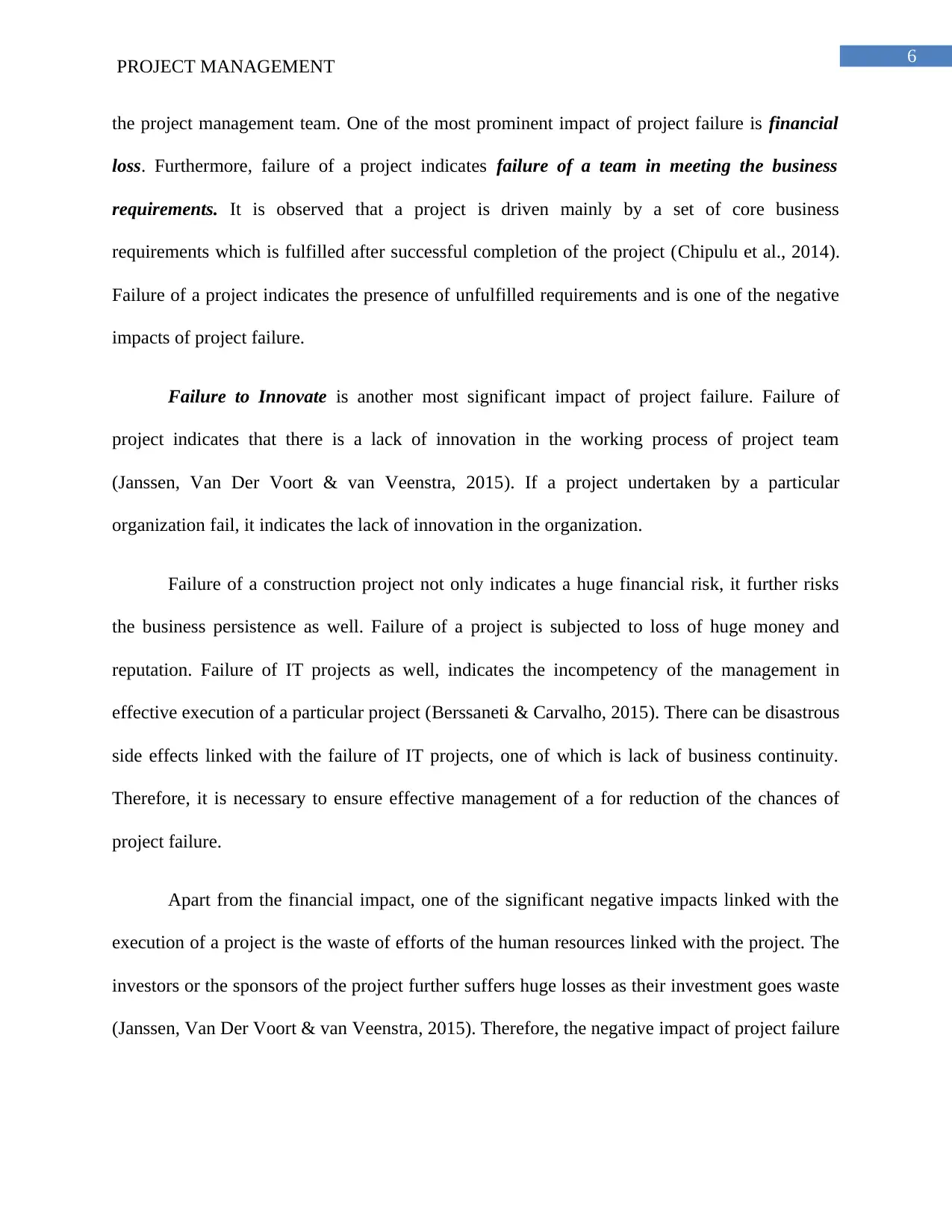
6
PROJECT MANAGEMENT
the project management team. One of the most prominent impact of project failure is financial
loss. Furthermore, failure of a project indicates failure of a team in meeting the business
requirements. It is observed that a project is driven mainly by a set of core business
requirements which is fulfilled after successful completion of the project (Chipulu et al., 2014).
Failure of a project indicates the presence of unfulfilled requirements and is one of the negative
impacts of project failure.
Failure to Innovate is another most significant impact of project failure. Failure of
project indicates that there is a lack of innovation in the working process of project team
(Janssen, Van Der Voort & van Veenstra, 2015). If a project undertaken by a particular
organization fail, it indicates the lack of innovation in the organization.
Failure of a construction project not only indicates a huge financial risk, it further risks
the business persistence as well. Failure of a project is subjected to loss of huge money and
reputation. Failure of IT projects as well, indicates the incompetency of the management in
effective execution of a particular project (Berssaneti & Carvalho, 2015). There can be disastrous
side effects linked with the failure of IT projects, one of which is lack of business continuity.
Therefore, it is necessary to ensure effective management of a for reduction of the chances of
project failure.
Apart from the financial impact, one of the significant negative impacts linked with the
execution of a project is the waste of efforts of the human resources linked with the project. The
investors or the sponsors of the project further suffers huge losses as their investment goes waste
(Janssen, Van Der Voort & van Veenstra, 2015). Therefore, the negative impact of project failure
PROJECT MANAGEMENT
the project management team. One of the most prominent impact of project failure is financial
loss. Furthermore, failure of a project indicates failure of a team in meeting the business
requirements. It is observed that a project is driven mainly by a set of core business
requirements which is fulfilled after successful completion of the project (Chipulu et al., 2014).
Failure of a project indicates the presence of unfulfilled requirements and is one of the negative
impacts of project failure.
Failure to Innovate is another most significant impact of project failure. Failure of
project indicates that there is a lack of innovation in the working process of project team
(Janssen, Van Der Voort & van Veenstra, 2015). If a project undertaken by a particular
organization fail, it indicates the lack of innovation in the organization.
Failure of a construction project not only indicates a huge financial risk, it further risks
the business persistence as well. Failure of a project is subjected to loss of huge money and
reputation. Failure of IT projects as well, indicates the incompetency of the management in
effective execution of a particular project (Berssaneti & Carvalho, 2015). There can be disastrous
side effects linked with the failure of IT projects, one of which is lack of business continuity.
Therefore, it is necessary to ensure effective management of a for reduction of the chances of
project failure.
Apart from the financial impact, one of the significant negative impacts linked with the
execution of a project is the waste of efforts of the human resources linked with the project. The
investors or the sponsors of the project further suffers huge losses as their investment goes waste
(Janssen, Van Der Voort & van Veenstra, 2015). Therefore, the negative impact of project failure
Paraphrase This Document
Need a fresh take? Get an instant paraphrase of this document with our AI Paraphraser
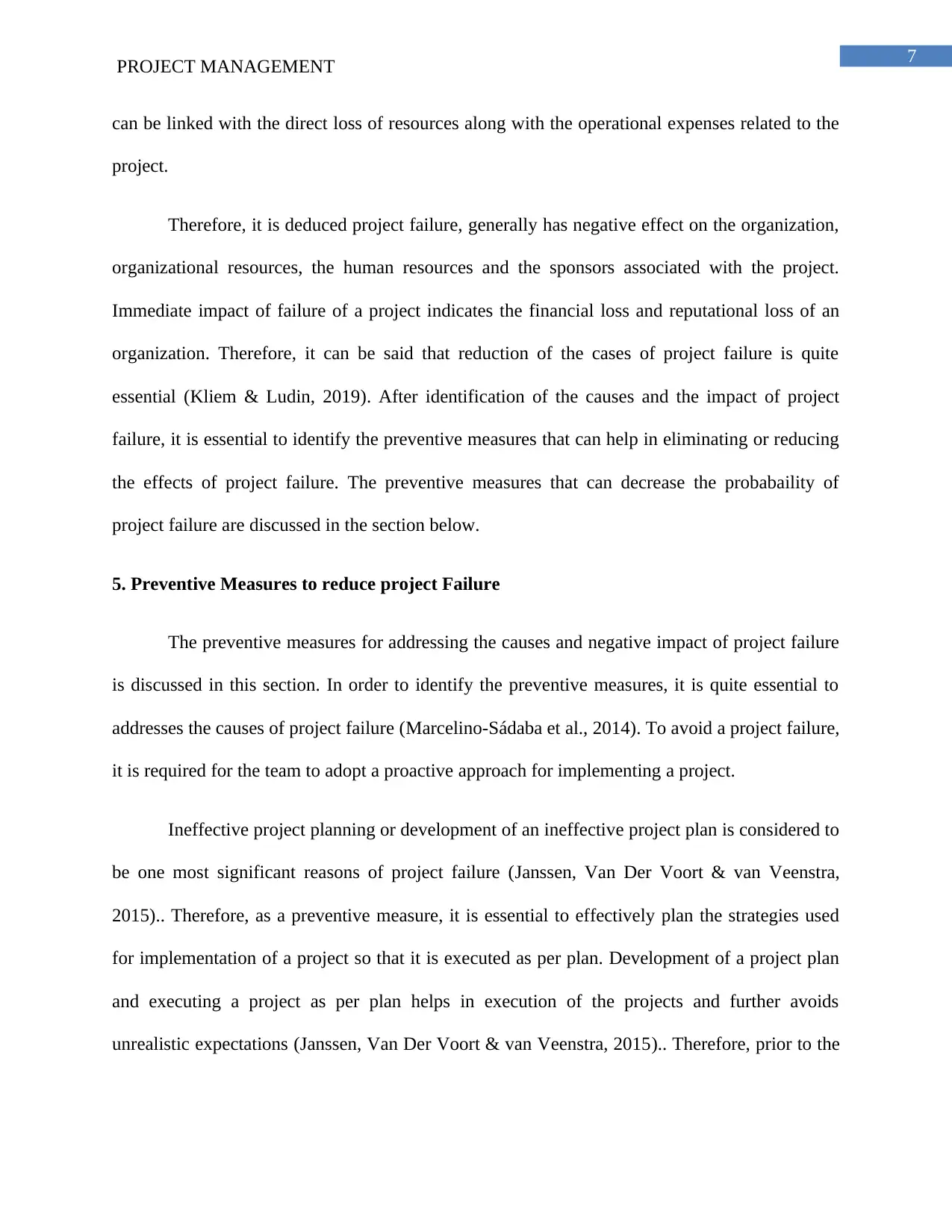
7
PROJECT MANAGEMENT
can be linked with the direct loss of resources along with the operational expenses related to the
project.
Therefore, it is deduced project failure, generally has negative effect on the organization,
organizational resources, the human resources and the sponsors associated with the project.
Immediate impact of failure of a project indicates the financial loss and reputational loss of an
organization. Therefore, it can be said that reduction of the cases of project failure is quite
essential (Kliem & Ludin, 2019). After identification of the causes and the impact of project
failure, it is essential to identify the preventive measures that can help in eliminating or reducing
the effects of project failure. The preventive measures that can decrease the probabaility of
project failure are discussed in the section below.
5. Preventive Measures to reduce project Failure
The preventive measures for addressing the causes and negative impact of project failure
is discussed in this section. In order to identify the preventive measures, it is quite essential to
addresses the causes of project failure (Marcelino-Sádaba et al., 2014). To avoid a project failure,
it is required for the team to adopt a proactive approach for implementing a project.
Ineffective project planning or development of an ineffective project plan is considered to
be one most significant reasons of project failure (Janssen, Van Der Voort & van Veenstra,
2015).. Therefore, as a preventive measure, it is essential to effectively plan the strategies used
for implementation of a project so that it is executed as per plan. Development of a project plan
and executing a project as per plan helps in execution of the projects and further avoids
unrealistic expectations (Janssen, Van Der Voort & van Veenstra, 2015).. Therefore, prior to the
PROJECT MANAGEMENT
can be linked with the direct loss of resources along with the operational expenses related to the
project.
Therefore, it is deduced project failure, generally has negative effect on the organization,
organizational resources, the human resources and the sponsors associated with the project.
Immediate impact of failure of a project indicates the financial loss and reputational loss of an
organization. Therefore, it can be said that reduction of the cases of project failure is quite
essential (Kliem & Ludin, 2019). After identification of the causes and the impact of project
failure, it is essential to identify the preventive measures that can help in eliminating or reducing
the effects of project failure. The preventive measures that can decrease the probabaility of
project failure are discussed in the section below.
5. Preventive Measures to reduce project Failure
The preventive measures for addressing the causes and negative impact of project failure
is discussed in this section. In order to identify the preventive measures, it is quite essential to
addresses the causes of project failure (Marcelino-Sádaba et al., 2014). To avoid a project failure,
it is required for the team to adopt a proactive approach for implementing a project.
Ineffective project planning or development of an ineffective project plan is considered to
be one most significant reasons of project failure (Janssen, Van Der Voort & van Veenstra,
2015).. Therefore, as a preventive measure, it is essential to effectively plan the strategies used
for implementation of a project so that it is executed as per plan. Development of a project plan
and executing a project as per plan helps in execution of the projects and further avoids
unrealistic expectations (Janssen, Van Der Voort & van Veenstra, 2015).. Therefore, prior to the
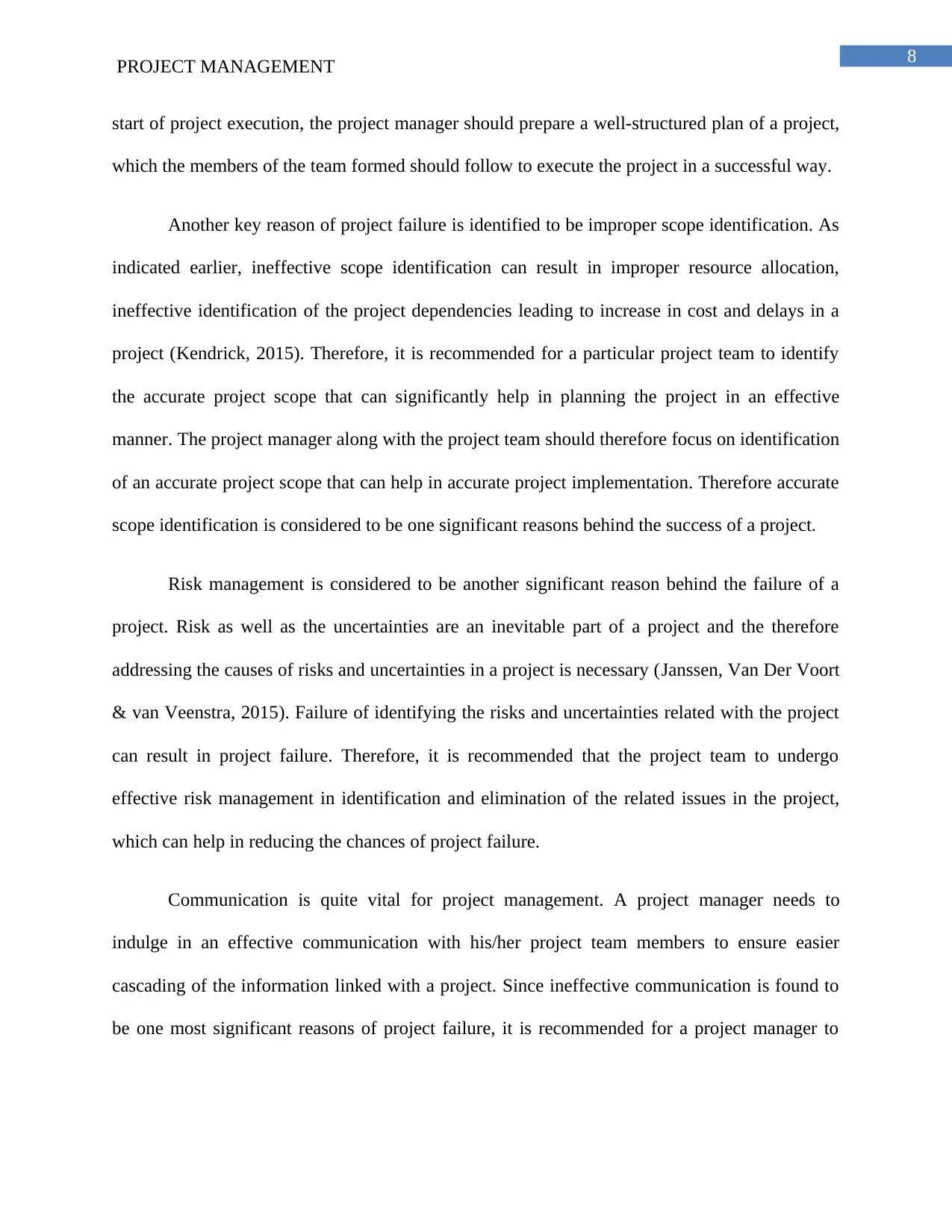
8
PROJECT MANAGEMENT
start of project execution, the project manager should prepare a well-structured plan of a project,
which the members of the team formed should follow to execute the project in a successful way.
Another key reason of project failure is identified to be improper scope identification. As
indicated earlier, ineffective scope identification can result in improper resource allocation,
ineffective identification of the project dependencies leading to increase in cost and delays in a
project (Kendrick, 2015). Therefore, it is recommended for a particular project team to identify
the accurate project scope that can significantly help in planning the project in an effective
manner. The project manager along with the project team should therefore focus on identification
of an accurate project scope that can help in accurate project implementation. Therefore accurate
scope identification is considered to be one significant reasons behind the success of a project.
Risk management is considered to be another significant reason behind the failure of a
project. Risk as well as the uncertainties are an inevitable part of a project and the therefore
addressing the causes of risks and uncertainties in a project is necessary (Janssen, Van Der Voort
& van Veenstra, 2015). Failure of identifying the risks and uncertainties related with the project
can result in project failure. Therefore, it is recommended that the project team to undergo
effective risk management in identification and elimination of the related issues in the project,
which can help in reducing the chances of project failure.
Communication is quite vital for project management. A project manager needs to
indulge in an effective communication with his/her project team members to ensure easier
cascading of the information linked with a project. Since ineffective communication is found to
be one most significant reasons of project failure, it is recommended for a project manager to
PROJECT MANAGEMENT
start of project execution, the project manager should prepare a well-structured plan of a project,
which the members of the team formed should follow to execute the project in a successful way.
Another key reason of project failure is identified to be improper scope identification. As
indicated earlier, ineffective scope identification can result in improper resource allocation,
ineffective identification of the project dependencies leading to increase in cost and delays in a
project (Kendrick, 2015). Therefore, it is recommended for a particular project team to identify
the accurate project scope that can significantly help in planning the project in an effective
manner. The project manager along with the project team should therefore focus on identification
of an accurate project scope that can help in accurate project implementation. Therefore accurate
scope identification is considered to be one significant reasons behind the success of a project.
Risk management is considered to be another significant reason behind the failure of a
project. Risk as well as the uncertainties are an inevitable part of a project and the therefore
addressing the causes of risks and uncertainties in a project is necessary (Janssen, Van Der Voort
& van Veenstra, 2015). Failure of identifying the risks and uncertainties related with the project
can result in project failure. Therefore, it is recommended that the project team to undergo
effective risk management in identification and elimination of the related issues in the project,
which can help in reducing the chances of project failure.
Communication is quite vital for project management. A project manager needs to
indulge in an effective communication with his/her project team members to ensure easier
cascading of the information linked with a project. Since ineffective communication is found to
be one most significant reasons of project failure, it is recommended for a project manager to
⊘ This is a preview!⊘
Do you want full access?
Subscribe today to unlock all pages.

Trusted by 1+ million students worldwide
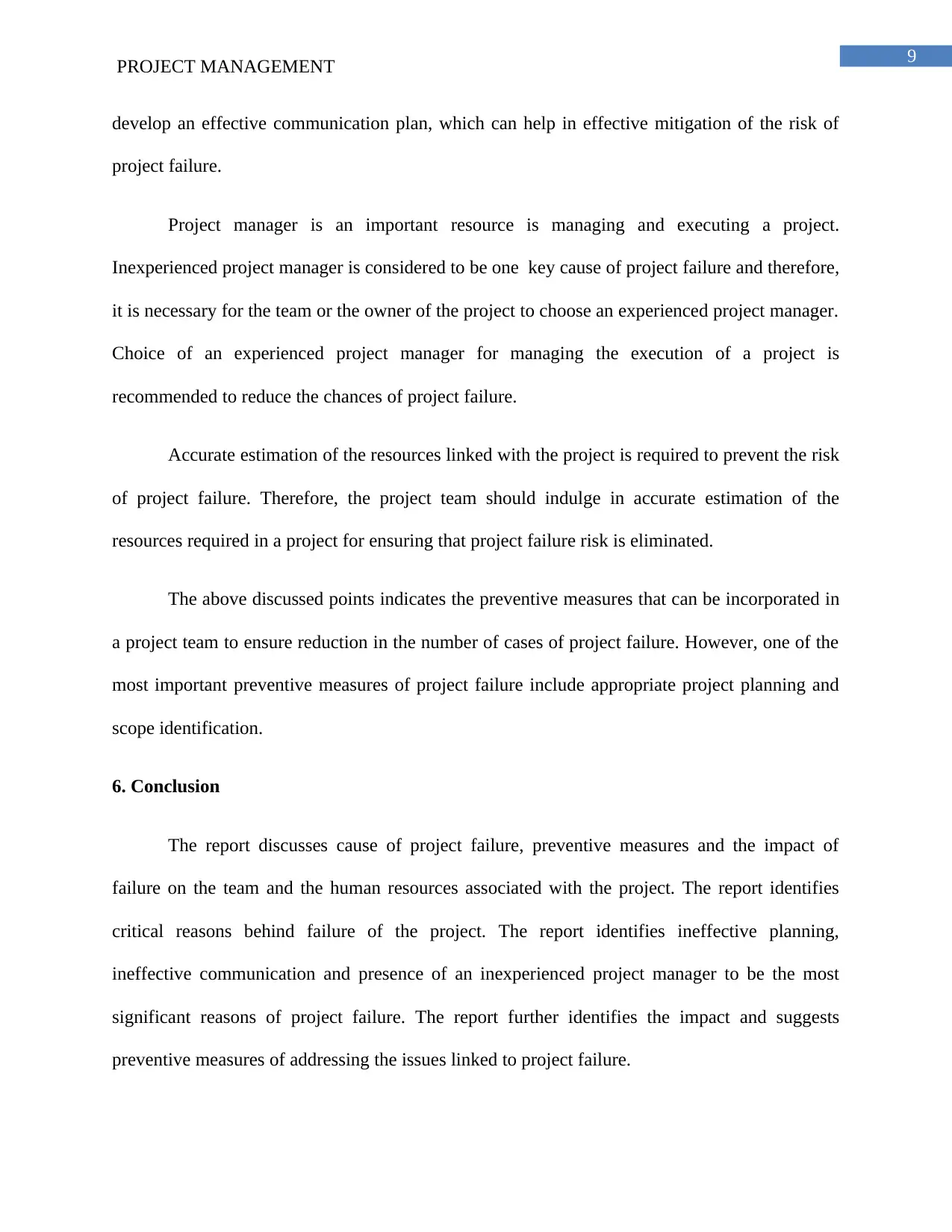
9
PROJECT MANAGEMENT
develop an effective communication plan, which can help in effective mitigation of the risk of
project failure.
Project manager is an important resource is managing and executing a project.
Inexperienced project manager is considered to be one key cause of project failure and therefore,
it is necessary for the team or the owner of the project to choose an experienced project manager.
Choice of an experienced project manager for managing the execution of a project is
recommended to reduce the chances of project failure.
Accurate estimation of the resources linked with the project is required to prevent the risk
of project failure. Therefore, the project team should indulge in accurate estimation of the
resources required in a project for ensuring that project failure risk is eliminated.
The above discussed points indicates the preventive measures that can be incorporated in
a project team to ensure reduction in the number of cases of project failure. However, one of the
most important preventive measures of project failure include appropriate project planning and
scope identification.
6. Conclusion
The report discusses cause of project failure, preventive measures and the impact of
failure on the team and the human resources associated with the project. The report identifies
critical reasons behind failure of the project. The report identifies ineffective planning,
ineffective communication and presence of an inexperienced project manager to be the most
significant reasons of project failure. The report further identifies the impact and suggests
preventive measures of addressing the issues linked to project failure.
PROJECT MANAGEMENT
develop an effective communication plan, which can help in effective mitigation of the risk of
project failure.
Project manager is an important resource is managing and executing a project.
Inexperienced project manager is considered to be one key cause of project failure and therefore,
it is necessary for the team or the owner of the project to choose an experienced project manager.
Choice of an experienced project manager for managing the execution of a project is
recommended to reduce the chances of project failure.
Accurate estimation of the resources linked with the project is required to prevent the risk
of project failure. Therefore, the project team should indulge in accurate estimation of the
resources required in a project for ensuring that project failure risk is eliminated.
The above discussed points indicates the preventive measures that can be incorporated in
a project team to ensure reduction in the number of cases of project failure. However, one of the
most important preventive measures of project failure include appropriate project planning and
scope identification.
6. Conclusion
The report discusses cause of project failure, preventive measures and the impact of
failure on the team and the human resources associated with the project. The report identifies
critical reasons behind failure of the project. The report identifies ineffective planning,
ineffective communication and presence of an inexperienced project manager to be the most
significant reasons of project failure. The report further identifies the impact and suggests
preventive measures of addressing the issues linked to project failure.
Paraphrase This Document
Need a fresh take? Get an instant paraphrase of this document with our AI Paraphraser

10
PROJECT MANAGEMENT
PROJECT MANAGEMENT
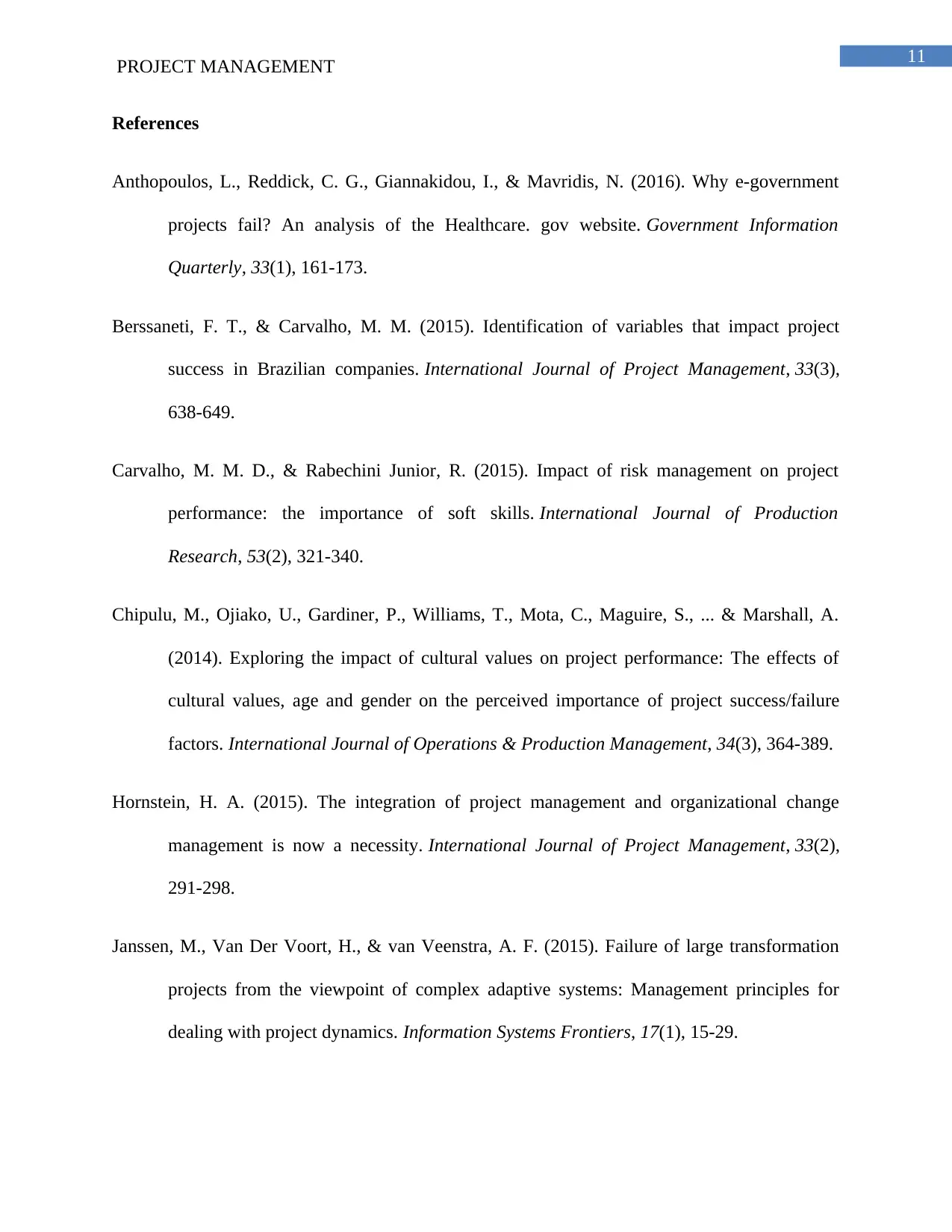
11
PROJECT MANAGEMENT
References
Anthopoulos, L., Reddick, C. G., Giannakidou, I., & Mavridis, N. (2016). Why e-government
projects fail? An analysis of the Healthcare. gov website. Government Information
Quarterly, 33(1), 161-173.
Berssaneti, F. T., & Carvalho, M. M. (2015). Identification of variables that impact project
success in Brazilian companies. International Journal of Project Management, 33(3),
638-649.
Carvalho, M. M. D., & Rabechini Junior, R. (2015). Impact of risk management on project
performance: the importance of soft skills. International Journal of Production
Research, 53(2), 321-340.
Chipulu, M., Ojiako, U., Gardiner, P., Williams, T., Mota, C., Maguire, S., ... & Marshall, A.
(2014). Exploring the impact of cultural values on project performance: The effects of
cultural values, age and gender on the perceived importance of project success/failure
factors. International Journal of Operations & Production Management, 34(3), 364-389.
Hornstein, H. A. (2015). The integration of project management and organizational change
management is now a necessity. International Journal of Project Management, 33(2),
291-298.
Janssen, M., Van Der Voort, H., & van Veenstra, A. F. (2015). Failure of large transformation
projects from the viewpoint of complex adaptive systems: Management principles for
dealing with project dynamics. Information Systems Frontiers, 17(1), 15-29.
PROJECT MANAGEMENT
References
Anthopoulos, L., Reddick, C. G., Giannakidou, I., & Mavridis, N. (2016). Why e-government
projects fail? An analysis of the Healthcare. gov website. Government Information
Quarterly, 33(1), 161-173.
Berssaneti, F. T., & Carvalho, M. M. (2015). Identification of variables that impact project
success in Brazilian companies. International Journal of Project Management, 33(3),
638-649.
Carvalho, M. M. D., & Rabechini Junior, R. (2015). Impact of risk management on project
performance: the importance of soft skills. International Journal of Production
Research, 53(2), 321-340.
Chipulu, M., Ojiako, U., Gardiner, P., Williams, T., Mota, C., Maguire, S., ... & Marshall, A.
(2014). Exploring the impact of cultural values on project performance: The effects of
cultural values, age and gender on the perceived importance of project success/failure
factors. International Journal of Operations & Production Management, 34(3), 364-389.
Hornstein, H. A. (2015). The integration of project management and organizational change
management is now a necessity. International Journal of Project Management, 33(2),
291-298.
Janssen, M., Van Der Voort, H., & van Veenstra, A. F. (2015). Failure of large transformation
projects from the viewpoint of complex adaptive systems: Management principles for
dealing with project dynamics. Information Systems Frontiers, 17(1), 15-29.
⊘ This is a preview!⊘
Do you want full access?
Subscribe today to unlock all pages.

Trusted by 1+ million students worldwide
1 out of 14
Related Documents
Your All-in-One AI-Powered Toolkit for Academic Success.
+13062052269
info@desklib.com
Available 24*7 on WhatsApp / Email
![[object Object]](/_next/static/media/star-bottom.7253800d.svg)
Unlock your academic potential
Copyright © 2020–2026 A2Z Services. All Rights Reserved. Developed and managed by ZUCOL.





